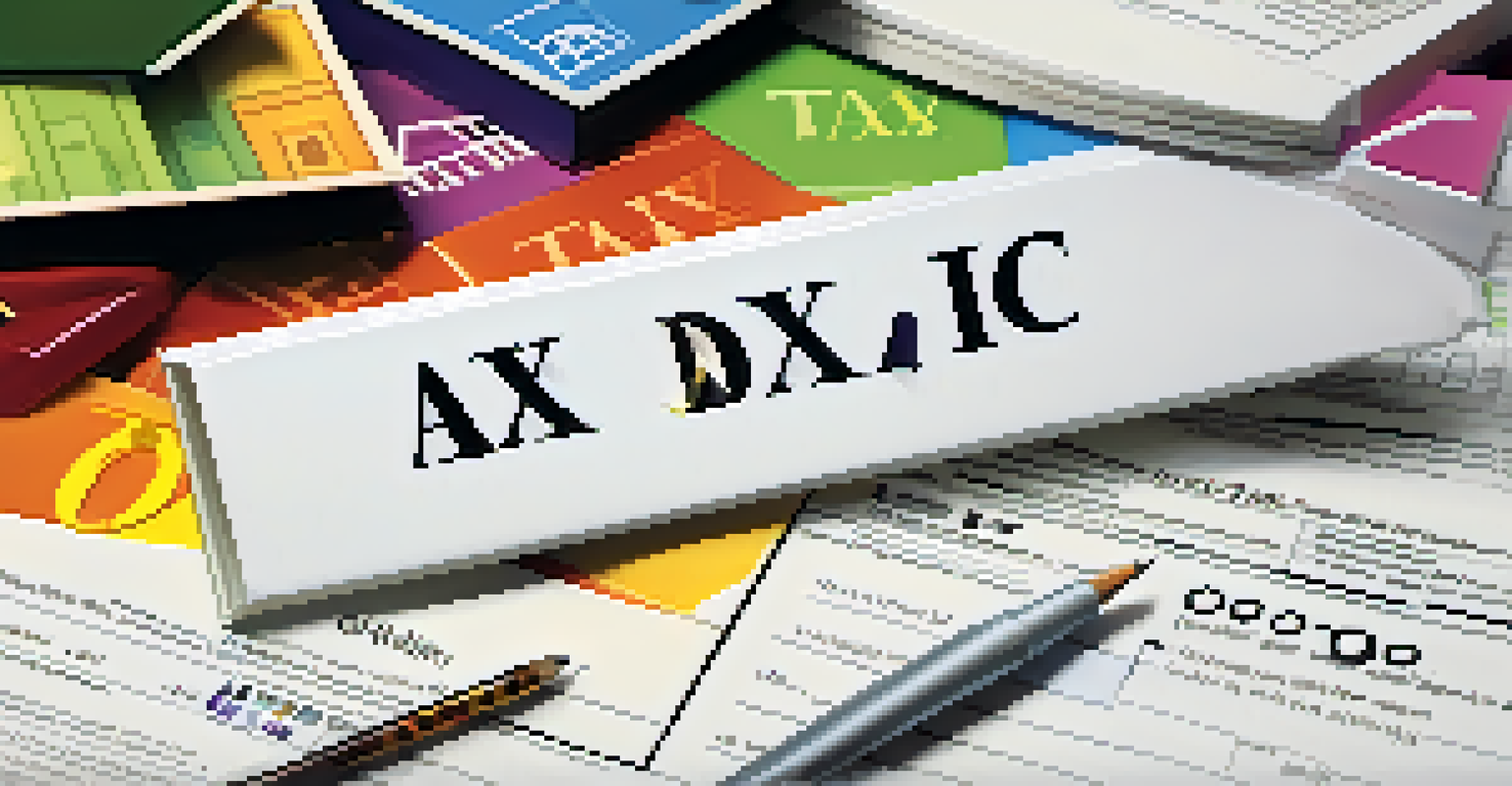How to Maximize Your Tax Refund: Tips and Strategies

Understand Tax Deductions and Credits to Boost Refunds
Tax deductions and credits can significantly impact your refund. Deductions reduce your taxable income, while credits directly reduce the amount of tax you owe. For example, if you qualify for the Earned Income Tax Credit, you might receive a refund even if you owe no tax at all.
In this world, nothing can be said to be certain, except death and taxes.
Make a checklist of common deductions, such as mortgage interest, student loan interest, and medical expenses. Many taxpayers overlook these opportunities, which could result in leaving money on the table. Remember, every dollar counts when maximizing your refund!
Additionally, credits such as the Child Tax Credit or education credits can also enhance your refund. By understanding and leveraging these options, you can ensure you're getting every penny you deserve.
Keep Accurate Records Throughout the Year
Maintaining organized records is crucial for maximizing your tax refund. Throughout the year, collect and store all relevant documents, including receipts, W-2s, and 1099s. This practice not only saves time during tax season but also helps you accurately claim deductions and credits.

Consider using digital tools or apps that allow you to track your expenses and income effortlessly. For instance, apps like Expensify or QuickBooks can simplify the process and ensure you don’t miss any deductions. A well-organized approach can make a substantial difference come tax time.
Maximize Refunds with Deductions
Tax deductions and credits significantly boost your refund potential, so it's important to understand and utilize them.
By taking the time to keep your records in order, you can avoid costly mistakes and maximize your refund potential. Plus, if you're ever audited, having thorough documentation will make the process much smoother.
Contribute to Retirement Accounts for Tax Benefits
Contributing to retirement accounts can be a smart strategy to reduce your taxable income. For example, contributions to a traditional IRA or a 401(k) can lower your taxable income for the year, potentially increasing your refund. It's like a win-win situation—you save for the future while reducing your tax burden today.
The hardest thing in the world to understand is the income tax.
Moreover, many employers offer matching contributions to 401(k) plans, essentially giving you free money. If you're not taking full advantage of this, you might be leaving potential refunds unclaimed. Check with your employer to ensure you're maximizing these benefits.
Incorporating retirement contributions into your tax strategy not only helps your future self but also boosts your current refund. It’s a smart move that aligns with both short-term and long-term financial goals.
Explore Tax Software and Professional Help
Using tax software can streamline the filing process and help you identify deductions and credits you might not be aware of. Programs like TurboTax or H&R Block guide you step-by-step through your return, ensuring you maximize your refund potential. Plus, many of these tools offer free versions for simple tax situations.
If your tax situation is more complex, consider hiring a tax professional. They can provide tailored advice and strategies that fit your specific financial situation. Working with an expert can uncover hidden opportunities for deductions that you might overlook.
Keep Organized Records Year-Round
Maintaining accurate records throughout the year helps you claim all eligible deductions and credits efficiently.
In the end, whether you choose software or professional help, investing in the right tools can lead to substantial gains in your refund. It’s an investment worth considering, especially if it leads to additional savings.
Review Your Filing Status for Potential Savings
Your filing status can have a significant impact on your tax refund. Depending on your situation—whether you're single, married, or head of household—your tax rates and eligibility for certain credits can change. For instance, married couples filing jointly often benefit from a higher standard deduction.
Take a moment to evaluate whether your current filing status is the best choice for your situation. Sometimes, married couples might find that filing separately yields a larger refund, especially if one spouse has significant medical expenses. It’s worth exploring all options to see which filing status maximizes your return.
Ultimately, reviewing your filing status is a simple yet effective way to potentially increase your tax refund. Don’t hesitate to crunch the numbers or consult a tax professional for guidance on which status suits you best.
Timing Your Tax Payments Can Impact Your Refund
When you pay your taxes can influence your refund amount. For instance, if you owe additional taxes and wait until the deadline to pay, you might end up with a smaller refund or even a balance due. Planning your payments throughout the year can help you avoid surprises come tax season.
Consider making estimated tax payments if you're self-employed or have other income that isn't subject to withholding. This proactive approach ensures you're on track and can prevent a large tax bill that could diminish your refund.
Stay Updated on Tax Law Changes
Being informed about evolving tax laws allows you to take advantage of new deductions and credits that can enhance your refund.
By being strategic about your payment timing, you can maintain better control over your tax obligations. This strategy not only helps with cash flow but also enhances your chances of maximizing your refund.
Stay Informed on Tax Law Changes and Updates
Tax laws are constantly evolving, and staying informed can help you maximize your refund. Changes in legislation can affect deductions, credits, and overall tax rates. By keeping up with these updates, you can ensure that you’re taking full advantage of any new opportunities.
For example, the Tax Cuts and Jobs Act introduced significant changes that might benefit certain taxpayers. Regularly checking resources such as the IRS website or following trusted financial news outlets can help you stay ahead of the curve.

Being proactive about understanding tax law changes can translate into real savings. It’s a small investment of your time that can yield significant returns when it comes to your tax refund.